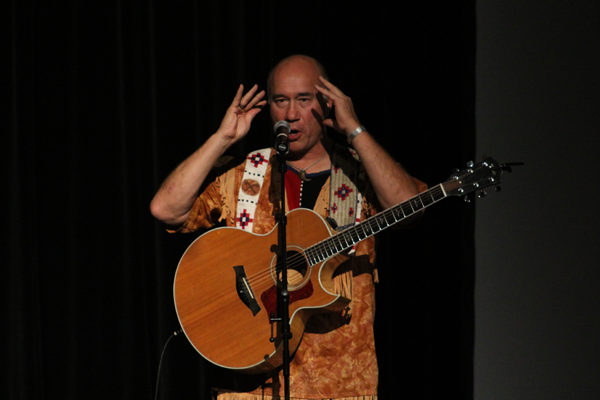By Alicia Diaz
News Editor
Photo gallery by Brittany Coates
Web edit by The Mane (Isabel Lohman)
Jack Gladstone is an award-winning story smith who originates from the Blackfeet nation in Montana. He illustrates the stories of their people through music, spoken narrative, and poetry. Gladstone also co-founded “Native America Speaks,” a lecture series from Glacier National Park which has gone on for 29 seasons. He was recently honored with the C.M. Russell Heritage Award for his attention to and publication of the history and culture of the American West. Gladstone held a performance at Metea Valley last Wednesday while doing a small tour around the Chicagoland area.
How has your heritage influenced your career and its success?
It’s a part of resolving trauma. I did see it on the Indian side of my heritage in Seattle. A lot of Blackfeet moved out after World War II in the 1950s, so half of my aunts and uncles drank themselves to death. A part of the recovery of that is to build bridges to bring people back to that mystical realization that we are children of this landscape. These stories that I tell, whatever Indigenous peoples’ stories survive, can help tune you into the pulse of the place. I regard that it’s important because there are whispers that are still in the wind and there’s twinkling of starlight, and the same stars shine and the same winds blew for our people. I aim to bring my talents, my songwriting, and speaking to bring some cosmos back into the chaos of our modern world.
Did your heritage create any barriers that you had to overcome? If so, how did you overcome them?
When I was little, when kids found out I was part Indian, they called me a “dumb Indian.” And then they found out I was part German. The Germans were the bad guys on one hand, and the Indians were the bad guys on another hand – from cowboy and Indian movies and such. It turns out the deeper you study and look you can find the story of the people. The path that they were on was not always a path that they controlled. Sometimes we’re swept away and sometimes we were victimized by forces outside of our control. The key is that the victims do not become the perpetrators. I’m fond of healing through music and empathy, and that is suspending our own perspective and connecting with other feelings and emotions.
What is the most rewarding aspect of your career path?
Traveling and getting to play for a bunch of strangers! I used to go across 46-50 states when my dad was alive and a million and a half miles on the road. The rewarding thing for me is to connect with an audience. I’m so far immersed in empathy with my topics and my subjects when I speak and when I write. You always want to make sure you’re doing the best well thought and well considered work. That’s not just your advocation, it’s your life and part of your identity. Not the whole thing, but part.
What is your greatest accomplishment? How did you get there?
My kids are my greatest accomplishment. I’m very pleased that they’re doing well with their educations and their work. Otherwise, just being a bridge to connect with people. The key is to illustrate the drama of that human experience and connect empathically with that experience. We’re all brothers and sisters. We’re all God’s kids.



